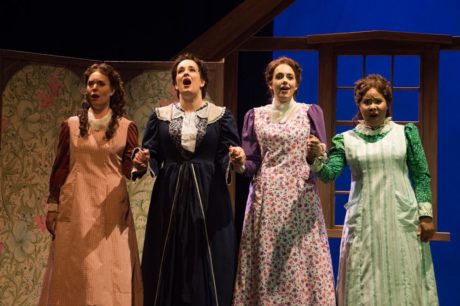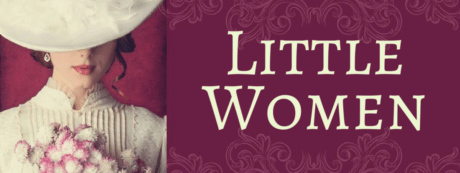Little Women, composed and with a libretto by Mark Adamo and based on the book by Louisa May Alcott, sweeps into the Annapolis Opera with gusto. This opera, directed by Artistic Director and Conductor Ronald J. Gretz and Stage Director Braxton Peters, graces us with reflections of a life that was and a life that could have been.

The first thing you notice upon seeing the Maryland Hall stage where Little Women will take place is four chests meant to hold mementos. What follows is the story of the March sisters whose belongings are kept inside these luggage chests. This smaller stage, in some ways, allows more physical closeness between the characters, making the moments where the opera’s theme of “things change” more striking than if there were literal spaces to fill. You see how each sister’s decisions take a toll on Jo March, whose narrative is followed throughout.
The feisty Jo is played here by mezzo-soprano Sarah Mesko. Mesko is charming in the role and it allows her to show her considerable vocal and acting talent. Following her is Jonas Hacker, the tenor who plays the part of Laurie, a friend of the March sisters. Laurie has married Jo’s sister Amy, whose character we find aptly portrayed by Brazilian-born soprano Ariana Wehr. From the moment Laurie declares to Jo that he is really in love with Amy Hacker’s stunning tenor pairs with a wonderful legato, filling every space in the room. At this moment I knew that I was witnessing a production that was very special.
The Annapolis Opera offers up a more-than-solid cast for Little Women. Rachel Arky gives a charming mezzo-soprano performance for the role of Meg March. In the opera’s stand-out aria “Things Change, Jo,” her vocal performance rightfully earned a round of applause. Claudia Rosenthal, portraying the sickly Beth, gives us a soprano performance that is equal parts gentle and forceful, while sometimes employing a unique and wavering vibrato. There are aspects of her soprano delivery that seem glass-fragile, making her tragic storyline all the more powerful. Wehr, as the persuasive and artistic Amy, is a convincing actress whose sharp and crisp vocals complement the character well.
In fact, there was not one weak singer or actor in this cast. Every single person in this production could have carried a lead role in an opera without a second thought. Of special note is Madeleine Gray as the imposing and wealthy aunt Cecilia. Her voice was particularly stand-out in a cast of stand-outs. Annapolis Opera, despite being a smaller local company, has produced a work that is artistically superior to many works produced by larger companies.
There were moments when a character would soar vocally and take the audience with them. The direction allowed each singer to move forward when they hit these moments during an aria, which increased the emotional impact. Opera is a unique format in that these unbridled displays are encouraged and desired. Duets play out nicely, especially between Meg and her soon-to-be husband John Brooke, portrayed by baritone Alexander Elliott. Arky’s sweet mezzo-soprano offers the perfect complement to Elliott’s baritone and neither aims too low or high. Mesko convinces us that, as Jo, she will challenge the system she is born in to. Her sprightly mezzo-soprano balances out the skepticism of her character.
Set Designer April Joy Vester gives us a detailed house for the March sisters to inhabit. The outline of windows makes the audience feel as though they are looking through the story, which adds to the “moment in time” narrative from which this opera is taken. Costume Designer Lorraine vom Saal gives us period-appropriate attire which, while typical in its New England plainness, uses a wide enough array of fabrics and colors to distinguish the characters from one another. Lighting Designer Michael Klima does a fantastic job of highlighting where the action is taking place, though I found some scenes to be slightly over or underlit.
The Annapolis Symphony Orchestra provides the music for Little Women. They play beautifully, and this show is as much a testament to their talent as it is to that of the Annapolis Opera. At times, however, the music did overtake the vocals and there was some difficulty in determining what was being sung during the choral parts. This is a minor issue and should not deter you from seeing this show.
While I was familiar with the story of Little Women, I was not familiar with this opera. The transcendentalist underpinnings of the original novel, complete with the belief that there is an inherent goodness in people, remain intact in Adamo’s libretto. Adamo clearly used the opera medium in a way that is both humorous and self-aware at times. Some of the composition itself suffered from what I feel was a lack of risk-taking, but the stellar cast at the Annapolis Opera makes up for a lot of the mediocrity in the material.
The Annapolis Opera is an absolute gem on the East Coast. Little Women proves that this company is capable of taking opera to the next level of artistry and performance. Any opera fan who is able to make it to Annapolis should consider this show or any show produced by the Annapolis Opera, a must-see.
Running Time: Two hours and 5 minutes, with one 20-minute intermission.
Little Women, produced by the Annapolis Opera, plays again on November 5, 2017, at 3PM at Maryland Hall for the Creative Arts– 801 Chase Street, Annapolis, MD 21401. Tickets can be purchased online.






https://www.youtube.com/watch?v=RvpDQwYQO0g